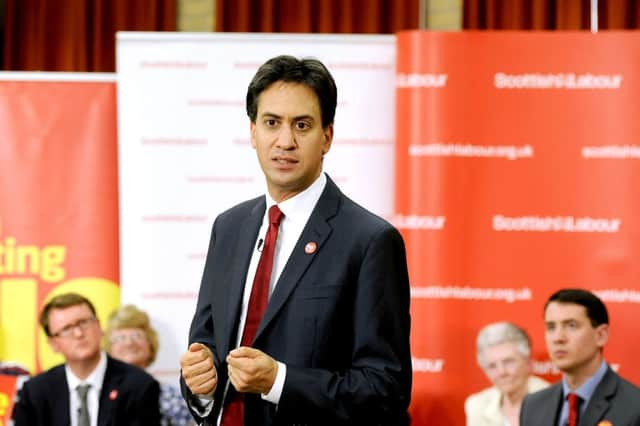Leaders: Labour’s no to SNP opens up questions


It was hard to see why the Labour leader would ever consider leaving the question open, because there seemed to be little in it for him. The SNP have already categorically ruled out any coalition with the Tories, a move in itself which supposes that such a thing was even possible, when it almost certainly was not.
Who are the SNP likely to vote with to have any hope of influencing policy? The answer was only ever going to be Labour.
Advertisement
Hide AdAdvertisement
Hide AdIt appears to be widely accepted that the two big parties are neck and neck in the country as a whole, so the big UK question is just how many Labour MPs Scotland will return, and will that number be enough to make Mr Miliband the leader of the largest party in the Commons? He is going to lose MPs to the SNP, it is just a question of how many.The discussion then shifts, after Mr Miliband’s declaration of no SNP ministers in his government, to exactly what the SNP will do to try and use its position to get what it wants. Mr Miliband has not ruled out a more informal arrangement whereby the SNP could offer a Labour minority government support on a vote-by-vote basis, known as “confidence and supply”. In fact, Nicola Sturgeon has said that she thought a formal coalition was unlikely and that the more informal relationship was more likely.
In some ways, an informal relationship makes a lot of sense. Parties will, of course, have to decide which way they will vote on any issue. And let’s not forget pragmatism here, if the SNP has no strong feelings about an issue one way or another it will probably see what its support would be worth, see what it could gain for its votes. There is a slightly troubling aspect to this, with Alex Salmond saying that SNP MPs would abandon the tradition of not voting on matters that solely affected English voters. That means there will be a lot of issues in which the SNP has no stake where it is willing to place its votes.
However, it has taken some of the power out of this position by limiting itself to supporting Labour, or abstaining. Hard to see how it could act any other way. That could make Mr Miliband’s sums easier for him.
But the other aspect of any informal agreement between the SNP and Labour will lie in the very poor relations between the SNP and Labour in Scotland.
True, they are locked in election tussle just now and have to be seen to be at each other’s throats. But these Scottish politicians are the ones that Salmond said would never be forgotten or forgiven for siding with the Tories during the referendum, that they had failed a generation. Jim Murphy has already said there should be no backroom deals with the SNP, and that probably is not just election positioning, but a healtfelt belief.
Putin predictably unpredictable
So Vladimir Putin is not dead. In fact by all accounts he appeared in the best of health when he popped up again yesterday in a video broadcast of a meeting with his Kyrgyz counterpart Almazbek Atambayev in St Petersburg.
It was the fist time the Russian leader had been seen in public since 5 March, and scheduled meetings had been cancelled. Of course rumours flew, that he was dead, dying, deposed or away becoming a dad again at the age of 62. But now he’s back, with no explanation of his mysterious absence, only a smiling reference to the gossip that had surrounded it. And as if to reinforce his return yesterday, he ordered the northern fleet of the Russian navy to conduct a massive combat-readiness exercise. It came as more than 45,000 troops, as well as warplanes and submarines, started major military exercises across northern Russia.
So what is the world to make of this? It is without doubt deliberate, but what is it designed to achieve? Perhaps a large part of it, from Putin’s point of view, is simply enjoyment at seeing what rumours fill the void. He probably likes seeing the West’s journalists nonplussed. But the chances are that the whole episode was engineered with just one thing in mind – to keep people guessing and reinforce the message that he is unpredictable and an enigma.
Advertisement
Hide AdAdvertisement
Hide AdAnd that delivers a powerful insight. Here is a man actively courting a reputation for secrecy and unpredictability. And that means that gaining trust and being seen to act with transparency and even maturity is not his aim or even a priority, so nictitated settlements and considered compromises are unlikely to figure much as he goes about his business in the world.
FOLLOW US
SCOTSMAN TABLET AND MOBILE APPS